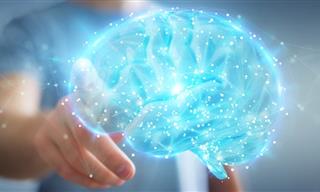
What is the difference between natural aging and Alzheimer's?
We all know that as we get older, our brain and body become weaker. In a natural aging process, it means that we may experience a slowdown in thinking and movement, but our intelligence is not be affected. On the other hand, in the case of Alzheimer's disease, damage to nerve cells in the brain will cause memory changes to worsen as more cells are damaged. Although it is possible to develop Alzheimer's at the age of 30, 40 and 50, in most cases it affects people aged 65 and over.
Changes in memory caused by old age will be related to the names of people or places, but changes caused by Alzheimer’s are expressed through forgetfulness that severely affects one’s ability to work and even engage in a social life and hobbies. It is recommended that you familiarize yourself with the following 10 sections to help you determine whether what you’re experiencing is a natural aging process or the development of Alzheimer's disease. If you notice these signs in your parents or even in yourself, it is recommended that you see your doctor to confirm or refute your concerns.
1. Memory loss that interferes with everyday life
One of the most common signs of Alzheimer's, especially in the early stages of the disease, is the forgetting of recently learned information. Other signs include forgetting important dates or events, repeating the same question, again and again, relying heavily on memory aids (e.g. notes) or family members for things that one would normally be able to take care of themselves until recently.
Age-Related Changes:
If occasionally you or your parents forget or miss a meeting, but you remember it after some time, it's a sign that it's just old age and not Alzheimer's. As long as the memory problem does not interfere with your normal functioning and doesn’t makes you forget many things and feel confused, you don’t have to worry too much.
2. Difficulty in planning ahead or solving problems
Some people with Alzheimer's sometimes feel a change in their ability to plan and follow clear instructions, especially when working with numbers. For example, they find it difficult to cook using recipes or keep track of monthly bills. In addition, many also suffer from concentration difficulties and take a long time to do things that they previously performed in a shorter time.
Age-Related Changes:
If you or your parents make mistakes in calculating your bills from time to time, this is not a sign of Alzheimer's disease, but simply a lack of attention from the aging process. This is natural, and if you go over the numbers again you’ll probably notice your mistakes.

3. Difficulty completing tasks at home, at work, or even at leisure
People with Alzheimer's often have difficulty completing simple daily tasks. They may have difficulty traveling to a place they've traveled to dozens of times before, working with numbers or even keeping track of the rules of a favorite game.
Age-Related Changes:
If you or your parents occasionally need help getting their TV to work, or fixing a computer or smartphone problem, it is not necessarily a sign of Alzheimer's, but simply a difficulty working with constantly changing technology, which is hard even for a person who doesn’t have Alzheimer's.
4. Confusion about time and place
People with Alzheimer's can completely forget today's date, what day it was yesterday, and even what season of the year we are in. In addition, they may have difficulty in understanding processes that aren’t taking place immediately and sometimes even forget where they are going, where they are, and how they got there.
Age-Related Changes:
If you or your parents forget which day of the week it is, but then remember at some point, it's a sign of old age and not Alzheimer's. Keep in mind that sometimes even young people forget the day and date, and the reasons sometimes include a lack of weekly routine. This may be caused, for example, by retirement and losing the sense of the weekend compared to the rest of the week.
5. Difficulties in vision and understanding of images and spatial relations
For some people, vision problems are a sign of Alzheimer's. These people will have difficulty reading, measuring distances, or noticing the differences between certain shades or colors. In addition, they may suffer from problems in spatial perception, such as not recognizing themselves when they pass a mirror, leading to them thinking someone is in the room with them.
Age-Related Changes:
It is known that vision is impaired by aging and therefore blurred vision is not necessarily an early sign of Alzheimer's disease. In addition, a problem with vision can be related to other diseases, such as cataracts or diabetes, so once you notice these changes, you should consult your doctor to rule out the variety of possible problems.

6. Development of difficulties in using words orally and in writing
People with Alzheimer's may find it difficult to join a conversation, stop talking in the middle of a conversation, lose their thread of thought while talking, and repeat themselves several times without noticing. They can also experience difficulty using rich vocabulary or even finding the right name for objects and people they are familiar with. This includes calling their children or their friends by incorrect names.
Age-Related Changes:
If you or your parents find it difficult to find the right word for what you want to say, it does not necessarily indicate the development of Alzheimer's disease. Aging causes many brain processes to slow down and memory itself no longer functions as it did in the past. As long as you don’t confuse words and call things by a name that does not belong to them, such a memory problem is not necessarily a sign of Alzheimer's disease.
7. Misplacing things and inability to retrace steps
A person with Alzheimer's is able to place objects in places they don’t belong without noticing, and often lose objects and fail to retrace the steps they took to help them find them. Sometimes Alzheimer's patients may even blame another person for stealing and as the years go by and the disease worsens, this may occur more frequently.
Age-Related Changes:
If you or your parents find it difficult to remember from time to time where you’ve put your glasses or the remote control, it’s not necessarily a sign of Alzheimer's disease. It is possible that these are problems that you’ve already dealt with in the past and are exacerbated only by old age. As long as this is not an unreasonable case, such as leaving your shoes in the refrigerator, there is no reason to worry much.
8. Poor judgment and difficulty in making decisions
People with Alzheimer's may feel a change in their judgment or decision-making abilities. For example, they may make poor decisions about money, being quick to hand out large amounts of money to telemarketers. In addition, they may pay less attention to cleanliness and grooming.
Age-Related Changes:
Making wrong decisions from time to time does not necessarily mean you have Alzheimer's disease. Telemarketers are often professionals who know how to "milk money" by using emotions rather than turning to logic. So even in this case, as long as you or your parents can still say "no thanks" and know that you don’t need a product that is being sold, you have no reason for concern.

9. Avoiding social activities or work
People with Alzheimer's may stop engaging in past hobbies and avoid social gatherings and anything related to work. They may even stop loving watching football because they aren’t able to follow their favorite team. The reason for these changes is the perception of all the difficulties that accompany them, which makes them realize that something is wrong with them and that they can’t function as they did in the past.
Age-Related Changes:
If you or your parents feel exhausted from work or you want to avoid social interaction, it is not necessarily a sign that Alzheimer's disease is involved. Exhaustion at an older age from work you’ve taken part in over many years makes sense, and avoiding contact with friends, especially when you feel obligated, is only a sign that your body and mind need some rest.
10. Changes in mood and personality
People with Alzheimer's may become completely different people and respond to situations differently than they would normally. They may be confused, suspicious, depressed, anxious or stressed. It may also be easy for them to succumb to sadness in the home and work environment, or experience depression while they are outside their comfort zone.
Age-Related Changes:
If you or your parents feel nervous or insecure after a change someone or something creates in the routine you have created for yourself, it only means that you have adapted your own ways of doing things and are not ready to change them at this point in your life. Changes in routine at an older age would irritate and disturb anyone, so it is not necessarily a sign of Alzheimer's disease. Note that mood swings can also be signs of other illnesses, so you may want to check with your GP.
A few words to finish...
Distinguishing between natural aging processes and Alzheimer's may sometimes be difficult, but if you or your parents experience some of the symptoms that are not age-related changes, you should consult your doctor for proper testing and treatment. It is also important to note that any such radical change alone may indicate other diseases, and therefore it is recommended not to rush to think that you might have Alzheimer's but to consult a doctor for a professional opinion.
Click Here for More Alzheimer's Disease Guides
 Go to BabaMail
Go to BabaMail




























